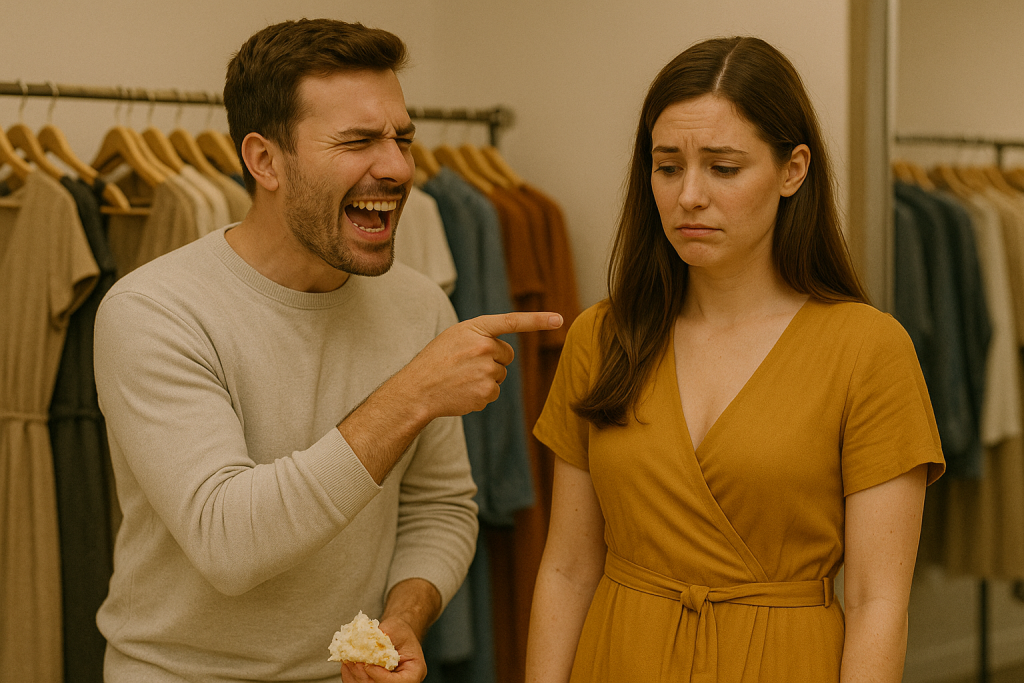This is a story for every woman who does not realize the nature of emotional abuse
I. The Cake
On her wedding day, the hall was a chandeliered sea, a field of heads and sequins. Sarah’s dress carried the hush of satin, the kind that makes a woman move as though she has a secret. Kian’s fingers fit her palm with the remembered ease of college corridors and bicycle lanes—their years measured in library lamps going dark and the apple-snap of campus winter. She had waited for him to grow into the job his father would approve of—“worthy,” the word his family coughed like a pearl lodged in the throat—waited without keeping count. The waiting, she thought, had made her patient; the love, brave.
They waltzed to a sentimental tune that had no right to be beautiful, and she laughed, light-headed, at Kian’s whispered nonsense. The four-tiered cake stood like a pale tower between them; the silver knife gleamed. When they pressed it down together—one of those staged gestures that pretend to be the future in miniature—Kian leaned, smiled at the crowd, and with an almost tender deliberation, slammed the cut wedge into her face.
Cream in her eyelashes. The sweet-sick smell of vanilla. The hall’s laughter arrived too quickly and expired too soon. She lifted her face, sugared and wet, blinking through white.
“It was just a joke,” Kian told the room, but looked at her, measuring. “It is funny, isn’t it?”
His mother had the thin-lipped look of someone who has felt a wind she doesn’t approve of. Then, seeing her son’s satisfaction, she rearranged her mouth to neutral and looked down upon Sarah—actually looked down, as though the bride were a misthreaded hem. “Don’t be so touchy,” she murmured, but not to Sarah—more like a reminder to the air—before she let Kian swing her into a quick fox-trot that the guests clapped for as though relief were a melody.
Sarah, cheeks chafed with napkin and embarrassment, thought: remember this. And then, obedient to the unspoken laws of public joy, she smiled as the photographer asked her to tilt her chin and be timeless.
II. Honeymoon Weather

They went to an island where the hotel sheets smelled of starched water. The sea had the greed of cobalt; they swam in it, briefly, like people who must be seen swimming. Afterwards Kian scrolled through his phone with the concentration of a penitent. She watched the screen-light silver his face each evening, a halo granted by algorithms.
“Do you remember Jenkins’s class?” she tried, once. “The way you used to pass me notes with drawings of giraffes during Shakespeare?”
He smiled without looking up. “You liked that? You were easy then.”
“Easy?”
“Not serious.” His thumb moved with the competence of a learned prayer.
There were gestures—a hand on her back as they crossed a street, a forehead kiss delivered without softness, as though the lips were a signature executed for form. But there was also the silence that grew its roots between them. When she laughed at a waiter’s joke about the local fish, Kian’s hand settled on her knee with a pressure that advertised kindness to the room and a warning to the tendon.
Later, in the room, he sat on the balcony scrolling. She lay on the bed and listened to the sea keep time. Her mind supplied a refrain: just a joke. It was only cake. You are still loved. The refrain returned, the way waves do, trying to credential themselves as truth.
In the mornings she made a ceremony of coffee: a cup for him, a cup for her, the steam twining like cursive. “It’s too sweet,” he said, tasting and setting it aside. “Mother makes it just right. She says the sugar should barely be seen, not tasted.”
“She can’t know how much sugar is in your mouth,” Sarah said, half playfully.
He stared at her as if she had stepped out of frame. “You don’t have to get defensive.”
The days were bright as bone. She watched him make videos of his breakfast, of his watch face catching the sun, of the horizon opening like a mouth. She was not in the videos. When he did turn the camera on her, her smile faltered, then held. She would not be the woman who ruined a good picture.
III. The Apartment With Four Mirrors

Their apartment hung its mirrors like moral instruction. One in the entryway (not for vanity, his mother said during her first visit, approving the placement, “but for a last check of order”). One along the hallway, tall and lean as a man who never eats dinner. One in the bedroom, a panel that promised candour. The fourth was an heirloom—a gilt oval that had once reflected a richer family’s quiet.
The first evening his mother came with a tin of almond biscuits and advice wrapped in tissue. “We are practical people,” she told Sarah, smiling like the moon’s thumbnail. “We don’t sulk. If you want to fit here, learn to be…useful. Kian’s sister is very useful.” She listed the sister’s virtues with the warm impartiality of an auctioneer: meticulous accounts, ironed curtains, a salad that respects the cucumber. “She keeps her voice even,” she finished. “People listen.”
Sarah parsed the pronoun: we. Useful. Even. She looked into the mirror and saw her posture tilt toward apology.
Kian’s comparisons were always small gifts that exploded later. “You know how Ma folds shirts? Edges to edges, so the lines meet.” Or: “Have you tasted my sister’s dal? It’s balanced. She doesn’t overdo the cumin.” Or, in a voice meant for only the two of them: “Ma never forgets birthdays. It shows care, doesn’t it?” His tone was without accusation—the invisible velvet of it was the trick. To object was to seem mad.
At dinner with friends he told curated stories about her—“Sarah thinks cilantro is soap. Isn’t that adorable?”—and when she offered a thought about a book or a policy, he smiled at her shoulder and said, “Look at you, trying to be serious,” as if she were a Chihuahua walking on hind legs. If she said nothing, later he would sigh: “You were so quiet; people will think you’re ungrateful.”
The smallest cuts have a fondness for the same places. “You’re not listening,” she said one night, after he laughed over her question about the rent renewal. He was not laughing at the rent. “You make me into a foolish woman in front of others. Then at home you make me into a scold.”
He spread his hands, a benevolent teacher. “You’re imagining things.”
“I am not.”
“You see? Dramatic. Mother is never dramatic. My sister would laugh and move on.”
The sentence was a blade dipped in honey. She tasted both.
After he slept—face soft, breathing ordinal—she took down the heirloom mirror and laid it flat under the bed. She told herself it was to keep it from accidents. In truth, she was tired of having to meet herself standing.
IV. Weather Systems

The house filled with people who loved Kian in uncomplicated tenses. His friends arrived with craft beers and a clatter of shoes; he was witty with them, generous, golden. His mother came every Thursday; the biscuits changed but the sentences did not. “A home,” she liked to remind the furniture, “is a reflection of its mistress.” She inspected surfaces with a glance that lifted dust where none existed. “And of her temperament.”
Sarah served tea with the caution of a person carrying an animal that might bite. “I made cardamom,” she said.
His mother took a sip, paused as if listening to a distant sound. “My son prefers ginger. Not too much. Did you know?” The look that followed was not inquiry but verdict. Sarah felt, absurdly, that she had failed an exam written on water.
Later, with just the two of them, Kian said, without malice, which is to say with the full force of it: “You do make it hard sometimes.”
“By serving cardamom tea.”
“By resisting.”
“What am I resisting?”
“The family rhythm. You keep stepping outside the circle.” He drew a circle in the air with his finger, a child’s geometry that left no space for doubt. “If you moved with us, you’d feel happier.”
She wanted to say: like the cake. We all slice, we all smile, we all pretend icing is cream. Instead, she said nothing. Silence, she had discovered, was the only argument he wouldn’t turn into a lesson about her tone.
On Sundays they visited his parents for lunch. His sister’s dal was indeed balanced; it had the modest excellence of a well-made sentence. The sister, who was careful with affection, hugged Kian ardently and Sarah briefly. “You’re very quiet,” she told Sarah once, butter-smooth.
“I’m listening,” Sarah said.
“To what?” the sister asked, untroubled. “There’s nothing to listen to. We’re only family.”
The afternoon light lay in squares on the floor. Sarah imagined herself as one of those squares—ordinary, easily stepped over. A plate clinked; laughter rose; someone told the story of Kian’s childhood debate trophy, the way other people tell the creation of a star. When Sarah mentioned a small promotion she’d been offered—a responsibility really, not quite a raise—Kian’s mother smiled with her eyes closed. “That’s nice,” she said, as if a child had shown her a drawing of a cloud.
On the way home, Kian kept one hand on the wheel and one on his phone, reading messages that required him to grin. “You pushed the promotion,” he said without looking up. “That felt…boastful.”
“I mentioned it.”
“Ma doesn’t enjoy that sort of talk. She believes in humility.”
“She also believes I over-brew tea.”
“Why are you always against her? She’s quietly strong. You could learn from that.”
Sarah looked out at the road, a dark tongue tasting distance. She imagined stepping out of the car at a red light and continuing on foot until the city thinned, until there was only a path and a bird and the world doing its work without human verdicts. The thought passed. The light turned green. She adjusted the hem of her dress, as if order could be called into existence by such touch.
V. The Study of Weather
Abuse, when it is silent, is a discipline. It trims. It curates. It is a house where you are forever a guest—sorry, thank you, of course, no trouble at all—while your name is written on the lease in a hand you can’t read.
She began to study the weather of their days. There were the low-pressure mornings after she had contradicted him: he dressed without presence, left his plate in the sink like a thesis on contempt. There were the clear afternoons when she complimented his work, his shoes, his sister’s dal—then he would text her a heart, throw an arm over the back of the sofa, call her “kid” in a tone that placed her snugly in his pocket. There were the evenings when he became historian: “Remember how lost you were before me? How I got you to apply for that job? Ma said I was generous to believe in you. She’s right. She knows women.”
Know is a large word. It can be used like a door.
In the office bathroom, under a light that was too honest, Sarah pressed a tissue to her lips and thought: if a joke hurts and only the person hurt can feel it, does it count as a joke? When she tried to tell a colleague a small version of the truth, the colleague—kind, time-poor—said, “If there’s no shouting, no hitting, maybe you two just need to communicate better.” The word just is a small whip.
That night, a rain that had waited weeks finally remembered itself and came down without panic. Kian stood at the window pleased, as if he’d ordered it. “Ma loves rain,” he said. “She says it makes the city confess.”
“Does she?” Sarah asked, and watched the glass stream.
“You should visit her more without me. Learn her ways. You’ll benefit. My sister did.”
“And is she happy?”
“Don’t be cynical,” he said. “It doesn’t suit you.”
She dreamed that the cake from their wedding followed her through rooms, still white, still tiered, humming “just a joke” in a voice that made tables shake. In the morning, the dream gave her a clarity that felt like a fever breaking. She stood before the tall hallway mirror—the one tall as a man who never eats dinner—and spoke to herself aloud, quietly, so that the apartment would not wake: You are not dramatic. You are not ungrateful. You are not a student in his class.
When she emerged for breakfast, Kian was reading something on his phone and smiling. “Ma says we should come for dinner tonight. She’s making ginger tea.”
“Tell her we can’t,” Sarah said. Calmly, as if moving a vase an inch to the left.
He looked up, surprised, like a man who has stepped onto an escalator and found stairs. “Can’t?”
“I have plans,” she said. The plans, not yet made, fluttered in her chest like small dependable birds.
He laughed. “You’re being petty.”
“I’m being busy.”
“Like my sister?”
Her smile had bones. “No. Like myself.”
He put the phone down as though it had become suddenly heavy. “You’re changing your tone. It’s unattractive. You know who never—”
“Please don’t say your mother,” she said, and the please was polished, not pleading. “Or your sister. I have heard their names enough times to think they live in my mouth rent-free.”
He stared as if her face were a puzzle whose picture had changed mid-solve. “Who are you becoming?”
“I’m becoming someone who doesn’t want cake on her face.”
His mouth opened and closed. He picked up the phone. “You’ll regret this,” he said—not a threat, more like a weather forecast he trusted. “People regret being alone.”
She thought of the silence he had installed in their rooms like an invisible chandelier. “I’m already alone,” she said, and the sentence landed like a coin in a clear jar.
He didn’t speak to her for two days. The house—with its four mirrors and useful surfaces—took on the bright emptiness of a show apartment. On the third morning she dressed, folded a sweater into a bag, and placed her toothbrush in a side pocket as if she were making a modest donation to a museum. She left a note—no, not a note; a sentence on a plain white card that had once been bought for thank-yous. I’m going to my own life now.

On the way out, she paused at the heirloom mirror under the bed. She pulled it out and set it upright against the wall. In it, the room looked exactly like itself. Her face did too. She felt no triumph. Only the severe peace of an answer finally spoken.
The rain began again, softer this time, as if resuming a conversation that would go on without end. In the lift, a child looked at her suitcase and said, “Are you going to the airport?” She smiled. “Something like that.”
Outside, the city behaved like a city: buses worrying the curb, a woman shouting into her sleeve, a dog making an honest attempt at dignity. Sarah walked, the handle of the suitcase warm in her palm. The air was the temperature of permission.
At a café she hadn’t tried, she sat by the window and ordered coffee—no ginger, no mother’s rules—and watched the rain draw faint hieroglyphs on the glass. She thought of the college green, of the streetlights that had once discovered them kissing. She thought of the cake, finally—how it had, in its violent sugar, given her a first translation. This is who I am working to be, the act had said on his behalf, and she had not believed the language until she did.
She drank. She listened. Her phone lay on the table, face down, a small dark mirror refusing its function. When it rang, she let it. The world kept happening.
Across the café, a woman asked another: “Do you think it will rain all day?” The answer, shaped by steam and weariness, was, “It might. But I brought an umbrella.”
Sarah closed her eyes and saw the four mirrors, each one learning how to reflect a room she no longer lived in. She opened them to the street that did not look back. The door chimed; the rain persisted.
When she stood to leave, she felt light and ordinary, like a person mid-walk. She stepped into the weather and took up her share of it. The day, unbetrayed by ceremony, waited. She did not hurry. She did not apologise. The joke, which had never been a joke, was finally over, and the punchline was that she still had a mouth.
She used it to hum—something shapeless, good—and moved through a city that had room for a woman carrying her own name.




Leave a Reply